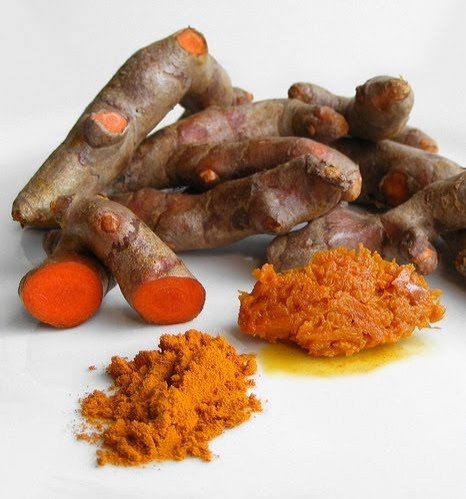Is Turmeric As Effective As Fourteen Other Drugs? Sacred Plant’s Ingredient, Curcumin, Holds Key To Health Benefits

It’s been called the “Spice for Life,” and has been an important staple of Indian cuisine, ancient medicine, and spiritual rituals for thousands of years. In recent years, turmeric and its active ingredient -- curcumin -- have gained attention in both the medical and media worlds, due to research that points to the herb's preventative and therapeutic qualities for diseases like arthritis, Alzheimer's and even cancer.
Turmeric, or curcuma longa, is a plant from the ginger family, also referred to as Zingiberaceae. It grows 5-6 feet high and is native to India and Southern Asia, growing best in tropical climates. It has been used mostly in Ayurvedic and Chinese medicine for its anti-inflammatory properties.
Turmeric has been used for thousands of years not only for medicinal or therapeutic purposes, but also in food, spices, dyeing and coloring. Turmeric is often boiled, dried and crushed into Indian curry. It has also been used to flavor other foods like butters, cheeses, or mustards – and is responsible for mustard’s yellow color.
Its yellow color also contributed to its status as a religious or holy herb in Indian culture, as it was associated with the sun, or Vishnu, in Hindu mythology. Tumeric also held a special place in Buddhism, where it was used in the yellow dye to color the robes of Buddhist monks.
Potential Health Benefits
Curcumin has been singled out as the active ingredient in turmeric that provides most of the anti-inflammatory qualities of the plant. A 2007 study described curcumin as having “antioxidant, anti-inflammatory, antiviral, antibacterial, antifungal, and anticancer activities,” listing diabetes, arthritis, and Alzheimer’s disease as some of the disorders curcumin can potentially prevent, or provide treatment, for. The same study referred to curcumin as a “Spice for Life.”
Curcumin has been the subject of thousands of studies, some of which have found turmeric comparable to fourteen various drugs and medications. FitLife.tv pulled these studies together and highlighted several that found turmeric to be as effective as a particular type of cholesterol medication, corticosteroids (steroid medications), blood thinner, and even antidepressants such as Prozac.
One study found that moderate amounts of curcumin reduced cholesterol in patients with acute coronary syndrome. Another 2008 study found that turmeric in combination with other medicines or herbs (in this case ghee, or clarified butter, and hyaluronic acid) could assist in gingival healing post-surgery. Though such experimental combinations may yield beneficial results, it is important to note that combining turmeric with other herbs or anti-inflammatory medicines may in fact pose health risks.
“Considering how strong a track record turmeric (curcumin) has, having been used as both food and medicine in a wide range of cultures, for thousands of years, a strong argument can be made for using curcumin as a drug alternative or adjuvant in cancer treatment,” Drew Canole, a nutrition specialist and “Transformation Specialist,” writes on FitLife.tv.
According to the American Cancer Society, curcumin has been shown to kill cancer cells but only in laboratory dishes; clinical trials in humans are still in the early stages. On its website, the ACS states, however, that "relying on this type of treatment alone and avoiding...conventional medical care for cancer may have serious health consequences."
Turmeric As Medicine Or Supplement?
While turmeric does hold a cultural and historical “track record” as having possible preventative and therapeutic effects, it is important to keep in mind that many studies on turmeric have differing results.
The University of Maryland Medical Center notes on its website that many of these turmeric studies are tested in animals and test tubes, rather than in humans. Furthermore, some studies have used a direct extract of curcumin only, rather than full turmeric.
Taking turmeric in large doses could, in extreme cases, upset the stomach and even cause ulcers. It has been known to potentially cause gallbladder issues, so people gallstones should only take turmeric under the direction of their doctor. And because turmeric slows blood-clotting, it should not be taken before surgery. In comparison to the potential side effects of long-term use of common anti-inflammatory medications like ibuprofen or aspirin, however, the side effects of turmeric are seemingly mild.
Foods that contain turmeric, since the quantity of the herb is much smaller, are considered safe.
Whether turmeric as a whole, or its active ingredient – curcumin – is more effective is still in question. Dr. Andrew Weil, founder and director of the Arizona Center for Integrative Medicine, writes of turmeric’s preventative and therapeutic benefits on The Huffington Post, offering different ways to add turmeric to your diet. He believes taking turmeric in its entirety is better than isolated curcumin pills, but notes that both have beneficial qualities, albeit slightly different effects.
While more clinical trials will be needed to more certainly decipher turmeric’s potential in modern medicine, it is at least known to be a decent supplement to an overall healthy lifestyle. Adding turmeric powder to food or tea can add both a somewhat bitter, and appealing, taste – and Dr. Weil believes it could be a good supplement to a well-balanced, healthy lifestyle that also includes exercise and an overall anti-inflammatory diet.



























